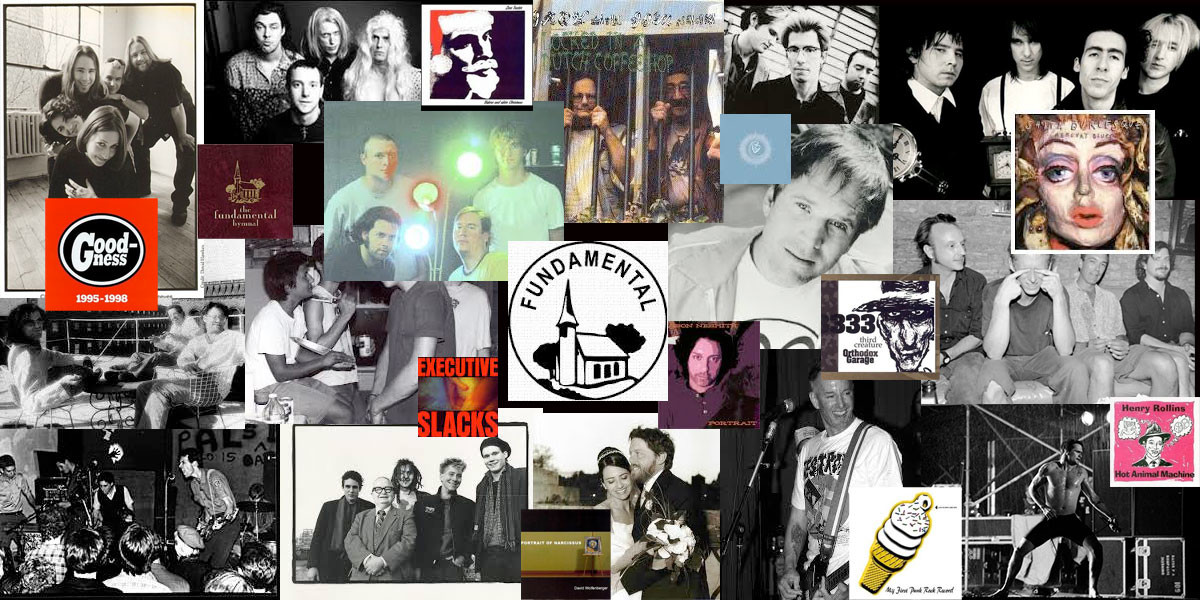The FUNDAMENTAL Label originated from a troubled adolescence.
Because I quit high school and had a difficult family life I could not take a real job. Instead, me, my cousin Brice and a friend – Jacob Bayer – began selling phonograph records at the numerous flea and farmer’s markets that dotted eastern Pennsylvania and southern New Jersey.
This transpired during the summer of 1975 after I returned from a two-month trip to the west coast with my brother where we learned about pan handling, how to accidentally visit gay men’s hostels, and how to sleep in bushes in urban parks.
The market scene was fun, but was a routine, not nine-to-five, but Monday-to-Saturday. For instance, on Mondays it was Tamaqua, Tuesdays in xxx, Saturdays in Peddler’s Village (near New Hope, PA) and at a small market south of Lambertville, New Jersey.
Selling overstocks and cut-outs purchased from distributors around Philadelphia (Scorpio) and New York City (Promo, Countrywide and Surplus, etc) that were run by gangsters (ie Morris Levy owned Promo), semi-gangsters – check out John Gervazoni in Stiffed by William Knoedelseder) – and old Jewish businessmen who did not understand music (except maybe that the Beatles were a good title). These music ‘experts’ did understand the concept of pieces – LPs were like carpet, units bought at x dollars and sold at y dollars, enabling an algebraic profit of y-x shekels.
When the market scene began to hibernate that winter, I began selling these same overstocks to various stores in the Philadelphia area, whose owners were either too lazy or ignorant to find the sources themselves. Hustling records was an interesting experience, especially for a young business-‘man’ not yet twenty years of age. But it was also an education in the dog-eat-dog world of the music business of the mid-1970s.
While most of my dealings were straight forward and legitimate, I did learn that there existed dishonest people in the music world and accordingly how to outmaneuver these predators.
One store – The Unique Selection (somewhere south of Philadelphia) – was probably a front for drug dealing and when they went out of business they sold me their stock. A good deal except that they the overstated worth of their inventory, so I recalculated the amount they received in exchange.
The most interesting experience was with Al Stranere, an older man who had spent his business life hustling and who ran a small shop down an alley off Market Street in Philadelphia. Stranere conned me into giving him $200 worth of records (“I’ll pay you tomorrow after I go to the bank”) which he never paid for; but for some reason that I will never understand, several months later he gave me some of his records to sell on consignment – guess where the proceeds went (I’ll give you a clue – Al called me ‘a dishonest prick’ and then slammed down his phone after I told him that the proceeds due him would pay off an old debt).
The hustler and market scene was fun, for a season, but travel was funner and in the summer of 1967 Jacob Bayer and I went to Europe. I reckoned that there must be overstocks in England, and accordingly, we went to search for them.
After receiving some tips – the best coming from an English market vendor who sat with his zipper open and his cock hanging out (I guess Jacob and I circumcised the real point) we found the best source, SPS Records in east London owned by the Harris family.
It seems that the elder Harris was a Mason and belonged to a London lodge which contained important executives from the spectrum of England’s music industry; accordingly, the Harris’ had access to the majority of the overstocks in England. Moreover, they also liked this young Yankee with cash (and who did not need invoices) and they became an innovative source for a young music importer. Jacob and I also made a short tour of Britain – it was cheap back then; a seven-day National bus pass cost £7, a pint of beer twenty-eight pence.
Europe was fun, but we had to return home and to make a long story short, Bayer Records, a precursor to FUNDAMENTAL imported British overstocks and sold them throughout the Northeastern United States. Not extremely exciting, but an important stepping stone from the market merchant of the 1970s to the innovative independent record executive of the 1980s.
(Richard Jordan)



4 comments for ““THE ORIGINS OF FUNDAMENTALISM””